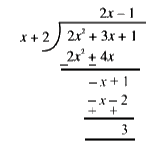The position vectores of the vertices A,B, C of a △ABC areˆi−ˆj−3ˆk,2ˆi+ˆj−2ˆkand−5ˆi+2ˆj−6ˆk respectively. The length of the bisector AD of the angle ∠BAC, where D is on the line segments BC, is
152
112
14
None of these
The correct Answer is:D
We have OA=ˆi−ˆj−3ˆk,OB=2ˆi+ˆj−2ˆk
andOC=−5ˆi+2ˆj−6ˆk
AB=OB−OA=ˆi+2ˆj+ˆk
AC=OC−OA=−6ˆi+3ˆj−3ˆk
|AB|=√12+22+12=√6
and|AC|=√(−6)2+32+(−3)2=3√6

Clearly , point D divides BC in the ratio AB:ACi.e1 :3<br> therefore Position vector of D=(−5ˆi+2ˆj−6ˆk)+3(2ˆi+ˆj−2ˆk)1+3
Position vector of=14(ˆi+5ˆj−12ˆk)
NowAD=14(ˆi+5ˆj−12ˆk)−(ˆi−ˆj−3ˆk)=34(−ˆi+3ˆj)
∴AD=|AD|=34qrt(10)
Topper's Solved these Questions
- BOOK - MHTCET PREVIOUS YEAR PAPERS AND PRACTICE PAPERSCHAPTER - VECTORS EXERCISE - (VECTORS ) Exercise 2 ( Topical problems )88videos
VECTORS
- BOOK - MHTCET PREVIOUS YEAR PAPERS AND PRACTICE PAPERSCHAPTER - VECTORS EXERCISE - ( MHT CET Corner)66videos
VECTORS
- BOOK - MHTCET PREVIOUS YEAR PAPERS AND PRACTICE PAPERSCHAPTER - TRIGONOMETRIC FUNCTIONS OF COMPOUND ANGLESEXERCISE - Exercise 2 (MISCELLANEOUS PROBLEMS)20videos
TRIGONOMETRIC FUNCTIONS OF COMPOUND ANGLES
Similar Questions
If the position vector of the vertices A,B and C of a ΔABC be (ˆi+2ˆj+3ˆk),(2ˆi+3ˆj+ˆk) and (3ˆi+ˆj+2ˆk) respectively, prove that ΔABC is equilateral.
View SolutionThe position vectors of the points A,B and C are (2ˆi+ˆj−ˆk),(3ˆi−2ˆj+ˆk) and (ˆi+4ˆj−3ˆk) respectively. Show that the points A,B and C are collinear.
View Solution
Knowledge Check
- Question 1 - Select One
The position vectores of the vertices A,B, C of a delta ABC areˆi−ˆj−3ˆk,2ˆi+ˆj−2ˆkand−5ˆi+2ˆj−6ˆk respectively. The length of the bisector AD of the angle ∠BAC, where D is on the line segments BC, is
A152B112C14DNone of these - Question 2 - Select One
The position vectors of the vertices A,B,C of a △ABC are ˆi−ˆj−3ˆk,2ˆi+ˆj−2ˆk and −5ˆi+2ˆj−6ˆk respectively . The length of the bisector AD of the angle ∠BAC where D is on the line segment BC, is : -
A152B34√10C43√10DNone of these - Question 3 - Select One
The position vectors of the vertices A,B,C of ΔABC are ˆi−ˆj−3ˆk,2ˆi+ˆj−2ˆk and −5ˆi+2ˆj−6ˆk respectively. The length of the bisector AD of the angle ∠BAC where D is on the line segment BC is
A152B34√10C43√10DNone of these
The position vectors of the vertices A,B and C of a triangle are ˆi−ˆj−3ˆk,2ˆi+ˆj−2ˆk and −5ˆi+2ˆj−6ˆk, respectively. The length of the bisector AD of the ∠BAC, where D is on the segment BC, is
View SolutionThe position vector of the vertices P, Q and R of a triangle areˆi−ˆj−3ˆk,2ˆi+ˆj−6ˆk,and −5ˆi+2ˆj−6ˆk, respectively. The length of the bisector PS of the △QPR, where S if on the segment RQ, is
View SolutionThe position vectors of the points A, B, and C are ˆi+ˆj+ˆk.ˆi+5ˆj−ˆk and 2ˆi+3ˆj+5ˆk, respectively . The greatest angle of triangle ABC is -
View SolutionIf the position vectors of the vertices A, B, C of a triangle ABC are 7ˆj+10ˆk,−ˆi+6ˆj+6ˆk and −4ˆi+9ˆj+6ˆk respectively, the triangle is:
View SolutionThe position vectors of vertices of a ΔABC are 4ˆi−2ˆj,ˆi+4ˆj−3ˆk and −ˆi+5ˆj+ˆk respectively , then ∠ABC is equal to
View Solution

